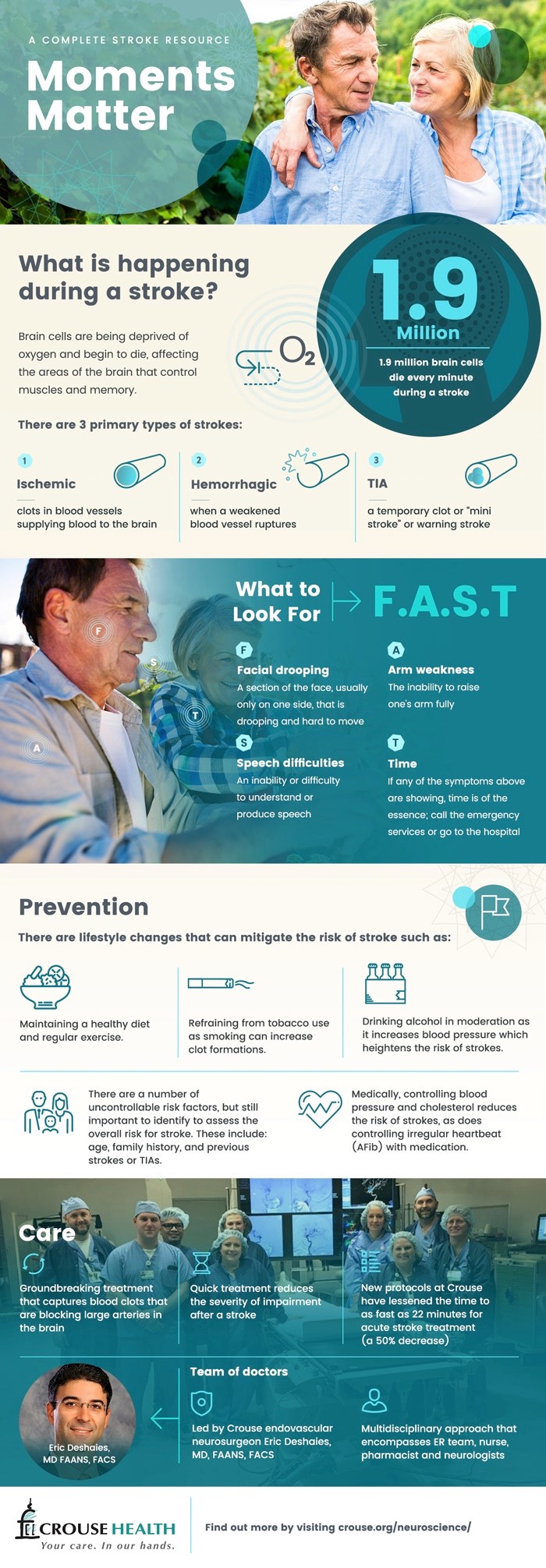What All Caregivers Need to Know About Stroke
Strokes present a severe threat to seniors over 65 years of age, and their sudden onset can make them disastrous if untreated. When symptoms of a stroke begin to occur, caregivers must act immediately to prevent permanent long-term effects and in some cases, death.
Although strokes can occur in people of any age, seniors over the age of 65 face the highest risk. According to the Heart & Stroke Foundation, over 75 percent of all stroke victims are age 65 or older, and the risk of stroke doubles for each decade past age 55. Age plays an important role in an individual’s stroke risk, but it’s not the only factor at play.
With World Stroke Day taking place on October 29th, now is the time to educate yourself and your loved ones on what to do in the event of a stroke.
What Causes a Stroke?
Strokes are commonly confused with heart attacks, but the two have entirely different causes. There are two types of strokes:
- Hemorrhagic strokes occur when a blood vessel carrying oxygen bursts, spilling blood into the brain. This deprives the affected area of the brain from oxygen, causing it to lose function.
- Transient Ischemic Attacks (TIAs) occur when a blood clot blocks a blood vessel in the brain.
Hemorrhagic strokes and TIAs share similar symptoms, however both are life-threatening and must be treated as quickly as possible. TIAs makeup over 80 percent of all strokes, and while they’re often referred to as “mini-strokes,” they pose a serious risk if left untreated.
What are the Signs of a Stroke?
To detect a stroke early, you’ll need to understand and identify the signs and symptoms. The earliest signs of stroke include:
- Sudden numbness or weakness of the face, arms, or legs (typically on one side of the body).
- Sudden confusion or trouble understanding others.
- Trouble speaking.
- Sudden trouble seeing in one or both eyes.
- Sudden dizziness, loss of coordination, or trouble walking.
- Severe headache with sudden onset and no known cause.
If you or a loved one begins to show, feel, or complain of these symptoms, immediately call 911. It’s better to misdiagnose a less severe illness as a stroke than ignore it until further symptoms appear. By the time your signs of stroke worsen, it may be too late to prevent resulting disabilities.
Teach your elderly loved one about the signs of stroke so they can prepare themselves. You may not notice the symptoms right away, so they should understand what to look for and how to react if they see the signs. The faster the stroke victim can get to the hospital, the higher their chances of survival without complications.
Are Strokes Preventable?
While hospitals are well-equipped to help stroke victims, the best way to treat a stroke is prevention. Family history and age all play a role in your risk of stroke, but there are risk factors you can control:
- Work with your doctor to prevent high blood pressure.
- Avoid the consumption of tobacco. If you smoke, quit doing so.
- If you have diabetes, do your best to manage it.
- Improve your diet and eat nutritional foods.
- Exercise daily.
High blood pressure, poor diet, smoking, and insufficient exercise can all skyrocket your risk of stroke. If your elderly loved one has any of these additional risk factors, work with them and help them understand what they can do to reduce their risk.
What You Should Do After Your Loved One Has Suffered a Stroke
Stroke victims are at a high risk of having one again during their lifetime, so understanding post-stroke care is important to your role as a caregiver. Your loved one may be much different after a stroke, but the right treatment, patience, and love can go a long way toward aiding their recovery.
- Your loved one may experience falls after recovering from a stroke. Don’t ignore these falls, as they can lead to broken bones and bruising.
- Work with your loved one and their doctor to reduce their risk of having another stroke.
- Your loved one may improve quickly after the stroke, but it make take years for them to regain certain functions. Be patient with their recovery.
- Stop post-stroke depression before it hinders your loved one’s recovery.
- Take note of changes in your loved one’s attitude or behaviour. If they begin to show signs of emotional lability, work with their physician to find a solution.
Caring for a loved one post-stroke is a long and difficult process. Rehabilitation won’t happen overnight, and you’ll need to be patient with your loved one as you empathize with their condition. In some situations, additional support is necessary to help an individual rehabilitate after their stroke, as post-stroke care may require around the clock care.
Image Source: Crouse Health Care
Book Your Free Home Care Services Consultation Today.
We go above and beyond the basics in providing advanced approaches to professional home health services. In addition to specialized care at home, you can choose from a complete range of reliable and compassionate home support, companion care, or personal care at home depending on your unique needs.

